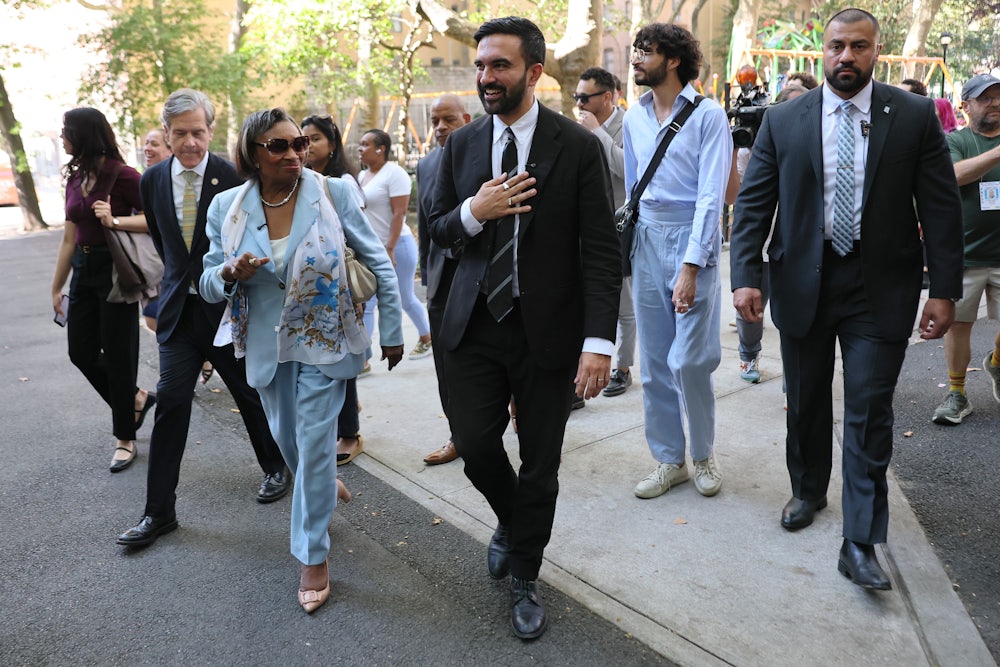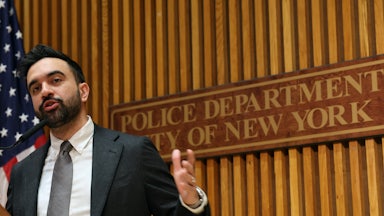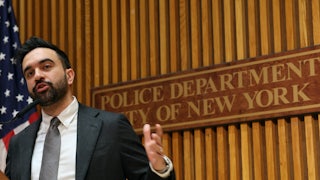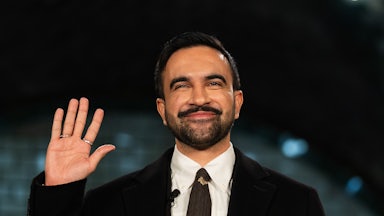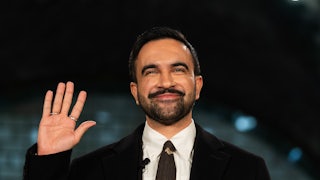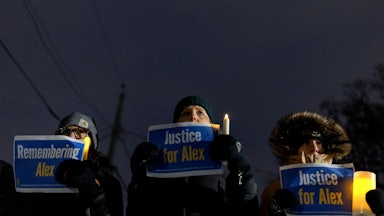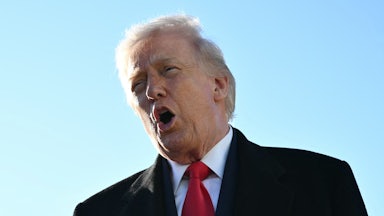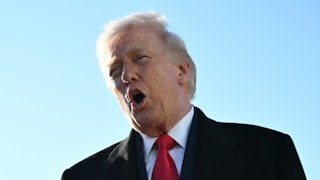Kamala Harris endorsed him. He drew plaudits (and showed he doesn’t just campaign on economic issues) by canceling a planned town hall with a local ABC station in protest of Jimmy Kimmel’s temporary suspension. More polls were released showing him way ahead.
It’s Mamdani Momentum. With his clever video and memorable policy ideas, Zohran Mamdani made headlines around the world with his brilliant primary campaign in New York City’s mayoral race that has already become a model for other Democrats. But what’s been less noticed is that Mamdani is now running a brilliant general election campaign that can also be a model for Democrats, particularly more progressive and left-wing candidates.
After his stunning primary victory in June, Mamdani had three major tasks in the general election. First, he needed to broaden his support among Democrats. He received 44 percent of the initial Democratic vote in the primary, putting him well ahead of his rivals but without enough support to win a general election that would include Republicans, independents, and Democrats who aren’t primary voters (i.e., most of them). Second, Mamdani needed to do whatever he could to prevent centrist and right-wing powerbrokers in the city from fully consolidating around either Mayor Eric Adams or former Governor Andrew Cuomo.
Third—and this is the hardest part—ideally, Mamdani needed to accomplish those other two tasks without watering down his platform. Mamdani is serious about stopping rent increases, expanding free childcare, creating city-owned grocery stores, eliminating fares for buses, starting a new department of community safety, and other proposals he made during the primary. He is less supportive of the Israeli government, the super-wealthy, and the police than many establishment Democrats. It was critical that he expand his coalition without changing his stances and turning into another unmemorable blah Democrat.
Six weeks out from Election Day, he’s done all that. It’s been a master class in politics. To gain more support among Democrats, Mamdani has courted not only rank-and-file voters but the party establishment that had shunned him in the primary. A few days after he won the primary, Mamdani went to an event at the National Action Network, the Black activist group run by Al Sharpton. Mamdani hadn’t done well in majority-Black neighborhoods or among older African Americans. He praised Sharpton so enthusiastically that the veteran politico looked surprised.
And that charm offensive continued. House Minority Leader Hakeem Jeffries, Senate Minority Leader Charles Schumer, Governor Kathy Hochul, and numerous other powerful figures in New York City politics refused to endorse Mamdani after the primary. Senator Kirsten Gillibrand not only refused to endorse Mamdani but made racist comments about him, saying he’d made references to “global jihad” (he had not, and she apologized). The New York Times, a hugely powerful institution in Democratic circles in the city and nationally, ran a ridiculous and widely mocked story implying that Mamdani had lied about his racial identity to get into better colleges.
While his supporters and many on the left slammed the center-left for not backing the winner of the Democratic primary, Mamdani and his campaign aides didn’t. The candidate repeatedly met privately with Democratic officials wary of him. He always emerged from those conversations presenting himself as cheery, not frustrated that Democratic officials refused to honor the results of the primary and the sentiments of their constituents. He and his staff kept talking to the Times despite the biased coverage against him.
“The core of my politics is not just sincerity, but also a desire for partnership,” he told reporters before one of his private meetings. He also kept campaigning in innovative ways, such as a scavenger hunt his campaign organized last month.
It’s all worked. Recent polls show that Mamdani is winning close to 60 percent of the vote among Democrats and is ahead among African Americans, a major coup considering Adams’s and Cuomo’s deep ties to the Black community in New York.
And with Mamdani strong in the polls, and having treated the party establishment with respect and deference, more centrist Democrats are gradually embracing him. He received recent endorsements (albeit somewhat reluctant ones) from Hochul and Harris. Jeffries has been noting that many of his allies are backing Mamdani, suggesting the House leader will eventually do the same.
It’s worth contrasting Mamdani’s approach to how Senator Bernie Sanders handled the 2020 Democratic primaries. Sanders cast his campaign almost entirely in class terms, namely that he was the voice of a forgotten working class. And when he won the early primaries, he did little to court the party establishment, which then quickly coalesced around Joe Biden.
In contrast, while Mamdani has made affordability the focus of his campaign, he has also emphasized other issues that might resonate with liberal New Yorkers who are fairly well-off economically: anger at ICE raids in the city, widespread opposition to Donald Trump, frustration with the Israeli government’s military campaign in Gaza. And he seems to recognize, unlike Sanders and some on the left, that the Democratic Party right now is a coalition of ideologies and groups, and not likely to become a truly populist/socialist party anytime soon. So Mamdani worked hard to get backing from non-socialist white progressives (Brad Lander, Senator Elizabeth Warren, Representative Jerry Nadler), center-left Black Democrats (Representative Yvette Clark), and very moderate figures in the party (Hochul.)
But while Mamdani has been kind to establishment Democrats, he has aggressively attacked two people: Andrew Cuomo and Donald Trump. From the start of the general election, Mamdani relentlessly blasted Cuomo. And not just in class war terms. He cast the former governor as old, dull, and scandal-plagued. And when Trump allies started hinting that he would intervene in the race to help Cuomo, Mamdani rightly recognized that as the gift it was. He leaned into partisanship, emphasizing that he was the Democratic nominee and that his opponent was allying himself with Trump.
Again, savvy. A New York City race of socialist (Mamdani) vs. capitalist (Cuomo) would have been hard. But a race between a Trump-hater (Mamdani) and a Trump semi-friend (Cuomo) is much better terrain for Mamdani. Cuomo and Trump may have played this stupidly, but Mamdani took advantage of their mistake. It became harder for the center-left establishment, the Times, and other Mamdani-skeptical power centers in New York to align with Cuomo as Mamdani kept correctly pointing out that the governor was Trump’s preferred candidate.
Through all this, what Mamdani hasn’t really done is abandon his policy positions. He had been a much more left-wing figure in the past, speaking in favor of defunding New York police for example. But for his primary campaign, he settled on a more modest platform instead of running on all of the ideas from his Democratic Socialist of America allies. Those ideas, like public grocery stores, of course are still fairly left-wing, but they’re less attack-able from the center.
In the general election, Mamdani has met business executives, police officers, and others outside of his base. He has apologized for anti-police rhetoric that he used in 2020 and distanced himself from the phrase “globalize the intifada.” What Mamdani has not done is sideline any of his major policy proposals. Nor has he had made commitments to centrists that would probably undermine his mayorship, such as keeping anti-reform Police Commissioner Jessica Tisch in her post.
You can see how Mamdani’s approaches could be used by progressive candidates running for major offices in heavily Democratic areas. Courting the establishment’s political support without bowing to its policy demands isn’t that hard in, say, Boston. But Mamdani’s general election campaign also offers lessons for Democrats running in red and purple areas, and nationally. Candidates seem inauthentic and unbelievable when they are constantly switching positions. It may have been wise for Harris to drop many of her 2019 liberal primary campaign pledges during her 2024 general election run. But her reluctance to do interviews and her wooden performances when she did sit for them happened in part because Harris was struggling to explain why her stances were so different compared to five years earlier. Her line that attempted to square this circle—“my values haven’t changed”—just wasn’t convincing.
There is now a big bloc of centrist pundits and organizations basically saying that Democratic candidates should run centrist campaigns during primaries too, to ensure consistency. Sure, that’s one approach. But Mamdani shows a different path. Find ideas that resonate with progressives and liberals but that you can also sell to some more conservative voters (perhaps with different language) in a general election so you can’t be labeled an inauthentic flip-flopper. Campaign to everyone, even people who you know disagree with you. At the same time, identify some clear villains who you strongly oppose.
I know, I know; Mamdani hasn’t even won in New York yet. Even if he does, he seems unlikely to get 50 percent of the total vote in the city. Even with those caveats, a 33-year-old socialist, with almost no management experience in or out of government, who has in the past taken extremely liberal stances on most major issues, is poised to be elected the mayor of America’s largest city, despite the reluctance of the most influential news organization in America and the most powerful figures in the Democratic Party. That’s big, and when you remind yourself of where he started from last year, it’s completely stunning.
The Mamdani primary campaign was a thrilling, exciting ride. But the slow grind of the Mamdani general election has been just as impressive—and perhaps an even more important example for other Democratic politicians.
